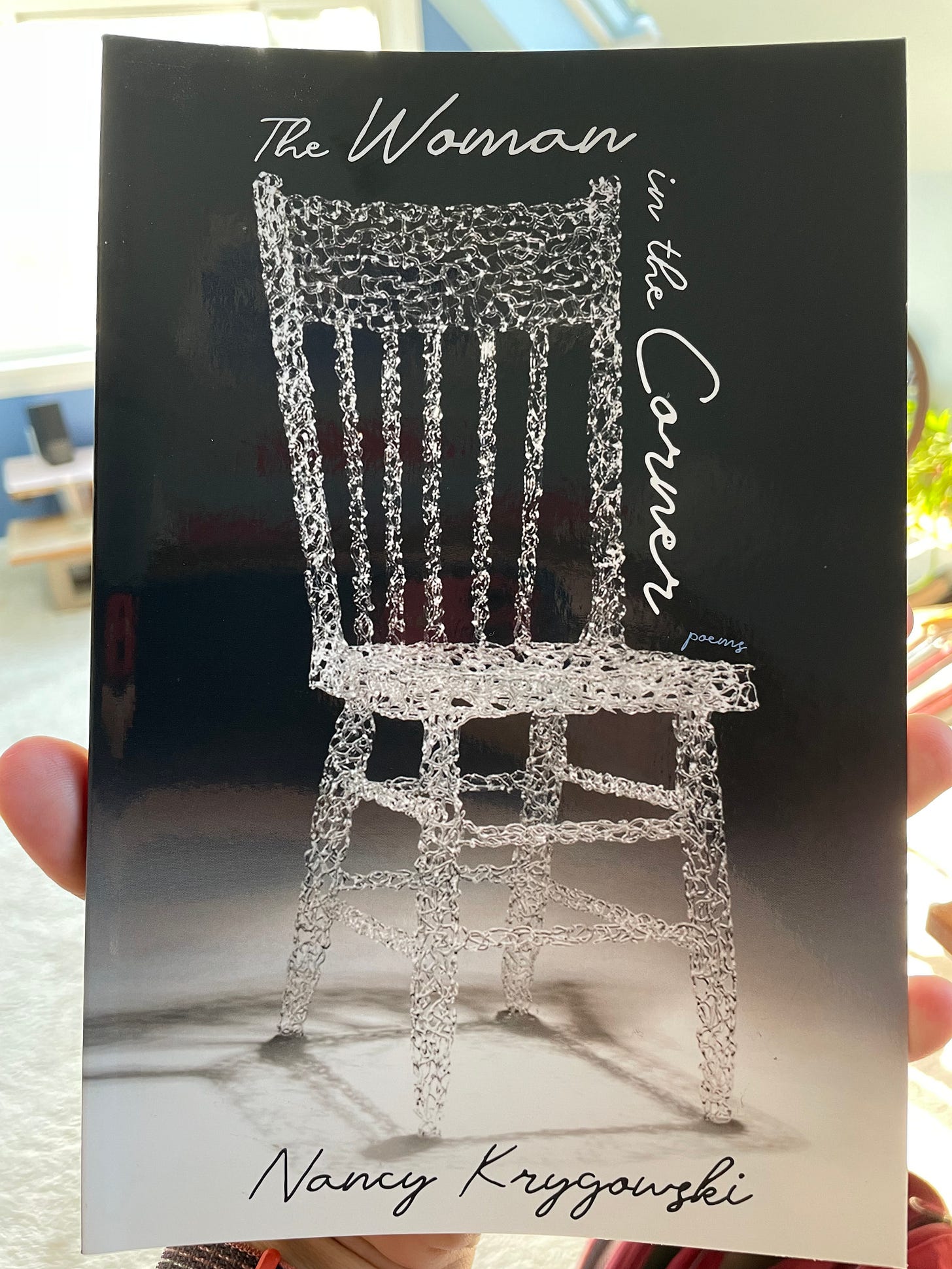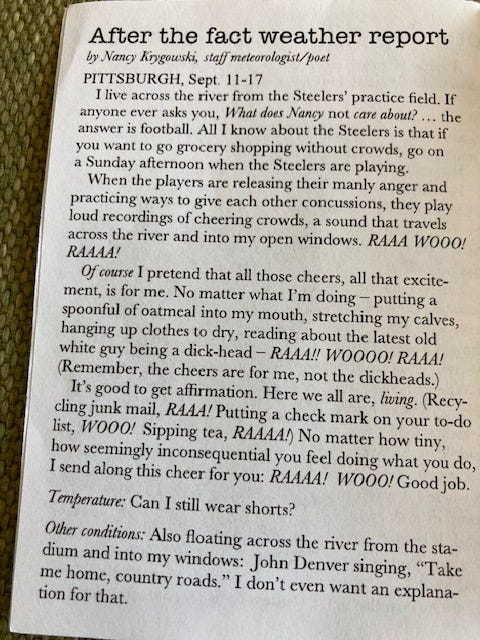Today, I’m excited to share an interview with poet, editor & teacher, Nancy Krygowski, which digs into her writing and mindfulness practices. I’d love your suggestions of other people I might feature here, so feel free to email me with ideas. You can just reply to this newsletter.
I heard of Nancy Krygowski long before I met her, as co-organizer of the Gist Street Reading Series, a legendary reading series in Pittsburgh that ran for a decade (and is still sorely missed). Then, I landed in Nancy’s Madwomen in the Attic poetry workshop back in 2014 when I was finishing my MFA at Bennington and massively pregnant with my son, Kai. I was terrified that having a child would mean I would never write again. Nancy’s brilliant teaching, and the community she built within that workshop, shored me up with the courage and humor to face multiple unknowns—and kept me writing throughout. Nancy’s poems also transformed the way I approach my writing. She brings to her poems a sense of play and a fierce attention to the textures of language and meaning (Here are a few recent poems of hers at Court Green). Her poems are hard for me to describe. David Kirby calls them “the love child of Walt Whitman and Joan Jett” and Diane Seuss speaks of their “ferocious wit and no-nonsense truth-telling thrill and sting.” Nancy is a singular person and poet—when you’re talking with her, she’s fully with you and it can be a little scary because she’s so brilliant, but the warmth and realness she exudes makes you want to lean in. She’s so wise and real about her writing and mindfulness practices, so read on, friends.
What is your writing practice like? Do you have any writing rituals?
It’s taken me a long time to be comfortable admitting this, but I’m a very erratic writer. I take long periods of time off from writing without any guilt. When I am writing, I’m often doing so in conversation with other writers—a friend and I will agree to share poems once a week, or I’ll do the Grind, where you commit to writing a poem a day, or I’ll do the prompts I give my students, or I’ll write in response to a book I’m reading. I prefer writing in the morning, but anytime I can quiet my mind and surroundings works. Coffee and someone else’s poems are a must to get me started. I also need to look at the sky.
What kind of writing are you working on? Are you working on specific projects or journaling or something else?
The most consistent writing I’m doing now is a column for the tiny weekly newspaper, Tiny Day*, which I edit with my friend Dani Leone. I’m the staff meteorologist/poet, and I write the After The Fact Weather Report, which is tangentially about weather and hopefully poetic. I’ve also been working for a long time on an essay about a friendship, and I have a bunch of poems I’m hoping to add to and shape into a manuscript soon.
What helps you when you get stuck with your writing?
Sometimes, when I’m trying to start something and it isn’t happening, I just stop. I give up. I know that sounds like a cop out, but it’s really a way to give myself some grace. But if I’m really wanting to finish a draft or I’ve got a line that keeps coming into my head and wanting a home, I usually do one of two things: dig into that idea of being in conversation, or rely on form. The conversation idea: I find a poem by a poet I love and imagine speaking back to the poem or the poet in some way. Or I’ll write a poem where I mimic the sentence structure of another poem. And for form, I turn to the abecedarian. I might not stick to that form, but it’s a way to get me started and to push me to the next line.
What are your mindfulness practices?
I am a daily meditator, though I do meditation lite—5-10 minutes. I’m also a cyclist, and the time on my bike really helps my brain. It’s wild, because sometimes I’m riding along, totally tuned into the beauty of my surroundings, which is mindfulness. But other times, I’m five miles into a ride, and all I’ve noticed is what’s happening in my brain. I guess that’s mindfulness, too. At this point in my life, I work to not let that riding brain go to negative places. (When I was working a job I had for many years, I often used the bike commute to and from work to replay all the injustices of the non-profit’s administration. Not a good way to spend time.) Another thing I do is tune into beauty and remark on it as often as I can—in nature, in people, in animals or birds, in the sky, in the colors of my house. Looking for beauty and not taking it for granted is a great mindfulness practice.
Do you see your writing and mindfulness practices as connected? In what ways?
Thanks for that question, because I’ve never really thought about it, but the answer is yes! Meditation, for me, is tuning into the quietness within me and to the universe and acknowledging our connection. Writing is about tuning into the quietness and about trying to make connections. There’s a trust I experience with both meditation and when the writing is going well—a trust to just be open. I believe, corny as it may sound, that writing poems is magic, that poems come from the smartest part of our brains, the part where we are not quite conscious. That also seems like meditation to me.
Do you see your writing and mindfulness practices as related to your teaching work?
Another great question! Teaching, for me, is all about connection and trust and beauty—so there’s a direct link! It’s an honor to be trusted to nurture other people’s creativity. Again, risking corniness, I’m in awe that my students produce poems, and in awe that I am able to help them do that. And because what we do first in workshop is to notice and appreciate, I go into my students’ poems looking for beauty. Also, mindfulness is about managing ego and managing expectations. Though I am an obsessive class planner, when class starts, there’s always a sense of letting go and seeing where our collection of brains and feelings will take us. Sure, I manipulate a bit to make sure I can get out the teaching points I want to make, but it’s mostly about letting go, really listening, and being open.
*Tiny Day is a weekly newspaper my friend started in San Francisco in 2019, and which has now spread across the country in a tiny way, with a lot of the writing coming from Pittsburghers. Our goal is to get people to stop looking at their phones and notice—and write about—the world. W e cover the sidewalk cracks, the trees and chickens, and what was happening behind the toaster while civilization crumbled around us. It's a collaboration between established adult writers, non-writers, and kids. You can buy Tiny Day for $1 at Brillobox, Bantha Tea Bar, Hazelwood Cafe, and White Whale. And if you write for us, TDY will come to your mailbox! Send news and photos to: newsroom@tinydaynews.com
A prompt from Nancy:
I love sentences; I love playing with syntax. So a prompt that always works for me and that I offer up is to find a poem that has sentences that interest you. Then write a poem of different content modeling your sentences off the poem’s sentences. I think by focusing on structure, you loosen your brain to allow surprising content to come up. Let yourself be surprised by what ideas surface (and trust those ideas!)
Nancy Krygowski is the author of The Woman in the Corner, named one of 2020’s top 100 poetry books by Library Journal, and Velocity, winner of the Agnes Lynch Starrett prize from the University of Pittsburgh Press. She teaches in Carlow University’s Madwomen in the Attic writing workshops and is a member of the Pitt Poetry Series editorial committee.
A native of Youngstown, OH, Nancy bounced around the country—first to DC, then to New England where she earned an MA from the University of New Hampshire, to San Francisco, then back to Ohio. After a summer in Nebraska, she found her way to Pittsburgh, a city she loves.
In her MA and MFA programs, Nancy was split between her desire to learn about teaching (composition and rhetoric) and her creative work. That split manifested itself, happily, for 20 years in her work teaching reading skills to adults and English to refugees and immigrants while she wrote, taught poetry workshops, and was active in the poetry world in Pittsburgh.
In 2021, Nancy, Terrance Hayes and Jeffrey McDaniel became co-editors of the Pitt Poetry Series following Ed Ochester’s retirement. In addition to this work, she continues teaching poetry workshops in Carlow University’s Madwomen in the Attic writing program, where her students thrill and inspire her. She also teaches private manuscript classes and does one-on-one poetry consultations.
For 10 years, Nancy and Sherrie Flick (along with a great crew of helpers) ran the wildly popular Gist Street Reading Series. This monthly series, housed at James Simon’s sculpture studio, featured emerging and underappreciated writers. It was fun. Some of those writers have gone on to win major awards, including a Pulitzer and several National Book Award nominations and winners.
Be Where You Are is a newsletter about how to use writing and mindfulness to be where you are. You’re always welcome to reply to this email, comment below, or find me on instagram (@mohnslate) or elsewhere. If you enjoyed this, I’d love it if you would subscribe, share this post online, or send it to a friend.





great interview with and appreciation of Nancy as fabulous poet, teacher, human.
Wow, thank you for this. So much to love and ponder here.